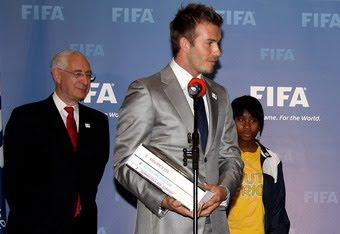
DAVID BECKHAM arrived in Zurich for the England’s hopeless 2018 World Cup bid tomorrow insisting he will NOT be returning to play in the Premier League with Everton.
Goodison Park boss David Moyes said he wanted England’s most capped outfield player to join the Blue Merseysiders on loan during the LA Galaxy off-season, having worked with the iconic Becks at the start of his career when he was on loan at Preston North End from Manchester United.
Beckham, a still-sprightly 35, delivered this devastating reply before the World Cup vote in Zurich tomorrow: "Moyesie has done an amazing job at Everton but I am a Manchester United fan.
“It is always great to be wanted by different managers and different teams. Even if it's on loan or a more permanent spell, it's always nice. But it’s too close to home... and United.”
Beckham joins Prime Minister David Cameron and Prince William in England’s “three Lions” strike force at the World Cup ballot tonight. But he knows Russia have emerged as firm favourites to attract the majority of the 23 votes from the much-maligned FIFA Executive Committee in Switzerland tomorrow.
Against the backdrop of new sex revelations – described as a “smear campaign” against England’s best known footballer – Beckham shrugged off the effect of Monday night’s controversial BBC Panorama investigation accusing FIFA officials of involvement in a £64m corruption scandal: “Hopefully I will make a difference. There are many people, like Prince William, who have been involved and working hard for the bid and to get it to this final point.”
Whilst the BBC are unlikely to attract English votes after accusing Brazil’s Ricardo Teixeira, CAF’s Issa Hayatou and CONCACAF chief Nicolas Leoz of taking bribes more than ten years ago, England’s bid team leader Andy Anson insisted: “FIFA gave us a very strong evaluation and have just published an economic study which puts England way ahead of its competitors.
“Of course I’m disappointed with the timing of the Panorama allegations. The FIFA executive committee is a small group of 22 people.
“If you hurt one of them of course it has an impact on others, that’s just inevitable. It won’t win us any votes. But if you combine the two, we clearly have the strongest bid. We have the perfect foundation.”
Sadly, both Anson and Beckham are deluded. England may have the infrastructure and the stadiums, but FIFA President Sepp Blatter loves to give the World Cup to controversial venues, as South Africans are only too aware after 2010. And with the Russians confident of at least ten votes, only five are left for England.
Spain and Portugal, who claim to have wrapped up eight votes already, are second favourites, leaving England ahead of just the environmentally-friendly bid from Holland and Belgium, who may claim no votes at all.
As this correspondent said last week, Russia deserve it – and they’re welcome to it if they really are going to spend £6bn on white elephants as FIFA reap the real rewards.
For further evidence, try this from Arsenal’s pint-sized “meerkat”, Russian ambassador Andrei Arshavin: ''We have never had a World Cup. Hosting it in Russia would open up new minds and new hearts for the game. It would be a completely new chapter for the World Cup.
''Russia is a huge country, the biggest on earth. Everything is extra-large, including the organisation of the game. We are building pitches, football centres, schools and training venurd in the most remote areas of our country, growing the game and providing opportunities for youngsters.
“We are working hard to modernise the infrastructure and we are building stadiums. It has been said that a huge effort is being needed. It is already underway, as can be seen in my native Saint Petersburg with the new stadium that will be finished by late 2012, or in Kazan, Sochi and elsewhere.”
So Russia it is then. Never mind the distances, the corruption, the crime, the reality. You read it here first. And 2022? Given Blatter’s predilection for money and the unusual, expect oil-rich middle-eastern minnows Qatar to beat off impressive bids from Australia, the USA, troubled South Korea and jittery Japan. That’s football.

